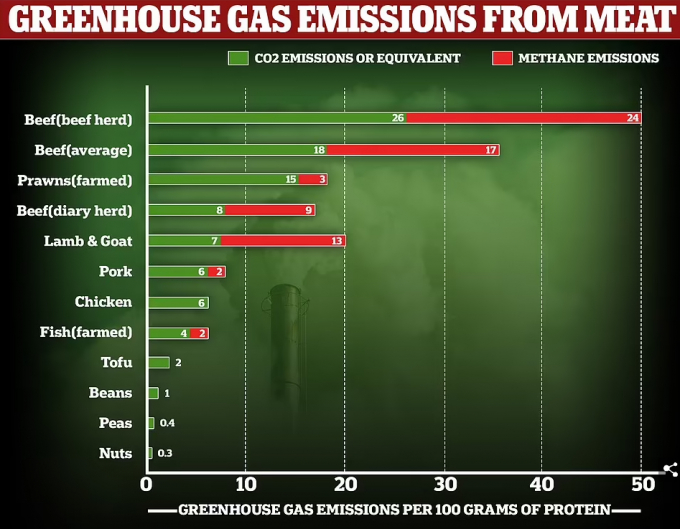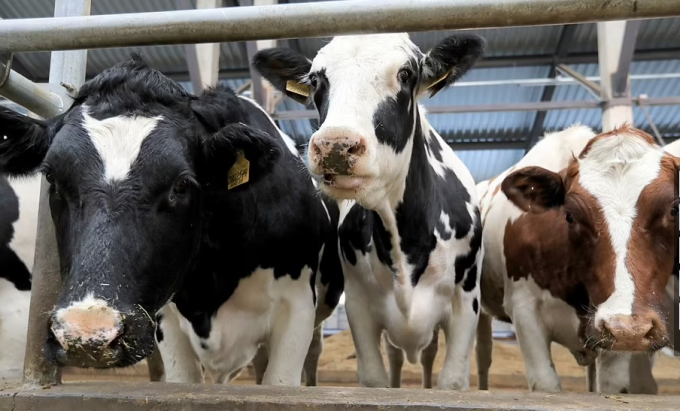November 28, 2025 | 04:04 GMT +7
November 28, 2025 | 04:04 GMT +7
Hotline: 0913.378.918
November 28, 2025 | 04:04 GMT +7
Hotline: 0913.378.918

Mr Valeur predicted that pork and other meats can be made more environmentally sustainable without drastically cutting supplies - but that production of beef, by far the most-polluting meat to produce, will have to come down in order to hit the targets. Source: DM
Jais Valeur, the CEO of Danish Crown in Denmark, spoke out after Denmark set binding targets for the agriculture sector to slash its emissions in half by 2030 to ward off global warming - a measure that could soon be copied the world over as all countries race to meet commitments made under the Paris Climate Agreement.
He predicted that pork and other meats can be made more environmentally sustainable without drastically cutting supplies by making more products from each animal - but that production of beef, by far the most-polluting meat to produce, will have to come down in order to hit the targets.
At the same time, demand for beef is set to increase - meaning prices will inevitably rise and steaks will become a 'luxury item' that people will be able to afford only on special occasions or while they are celebrating.
Speaking to Danish newspaper Berlingske, Mr Valeur said: 'Beef is not going to be super climate friendly. It will be like champagne, namely a luxury product.'
Currently, meat production accounts for some 15 per cent of yearly greenhouse gas emissions, with beef alone accounting for 40 per cent of that total.
Beef production has risen by 149% in the last 60 years, with the top-producing regions being the United States, Brazil, the EU, China and India. All have signed up to the Paris Agreement to cut emissions by 55% by 2030 and reach net-zero by 2050.
Without any action, scientists say meat production alone will consume half of the 'emission budget' that world leaders have limited themselves to using to keep temperature rises below 1.5C.
In a letter to the Lancet Planetary Health journal, researchers have also warned that livestock production must reach its peak within the next decade in order to tackle the climate crisis.
The scientists called on countries to 'declare a timeframe for peak livestock,' after which production would not increase.
They also warned that land must be repurposed and natural vegetation like forests restored in order to remove Co2 from the atmosphere. But livestock currently occupy much of that land which needs to be restored.
'Countries should be looking for peak livestock within the next 10 years,' said Helen Harwatt, a fellow at Harvard Law School in the US and lead author of the letter. 'This is because we need steep and rapid reductions in greenhouse gas emissions, as we are reaching dangerous temperature tipping points.'
Mr Valeur explained that some emissions cuts can come from making the transport of meat more environmentally friendly, improvements on farms, and using more parts of the animals that are slaughtered.
But to hit the most-ambitious targets, production - especially of very polluting meats like beef - will have to be reduced, causing prices to rise.
While exact price rises are difficult to predict as demand changes over time, the hardest-hit countries are likely to be Argentina, US, Brazil and Australis which currently consume the most meat.
Mr Valeur also pointed to a shift toward using retired dairy cows for meat production, which produces two thirds less greenhouse emissions than cattle. But dairy cows still emit more greenhouse gases than pigs of chicken.
He said: 'We will still have a production, but it will be a production of beef and veal that comes from dairy cattle, calves and beef cattle that graze in the meadow and create biodiversity.
'The beef cattle will be a luxury product that we eat when we need to pamper ourselves.'
About a third of Danish-produced beef comes from these dairy cows, another third from calves and the other third from beef cattle.

Currently, meat production accounts for some 15 per cent of yearly greenhouse gas emissions, with beef alone accounting for 40 per cent of that total. Photo: DM
Mr Valeur said there will also be a move towards more 'climate-friendly' meat like pork and the production of beef that comes from dairy cattle which are killed once they stop producing milk.
He explained: 'I think the pig will be a good bet for a climate-friendly protein, which also happens to taste good. The different calculations that are of the climate footprint from pork show that they are approaching chicken in climate footprint.'
The global demand for meat is growing due to a range of factors including people getting richer, urbanisation and population growth.
In addition, experts believe global meat consumption will continue to increase by 12%.
With global meat consumption and demand set to increase over the coming years, if beef farmers are forced to cut production in order to meet climate demands, prices could soar.
And Mr Valeur said that in order for his company to meet their climate targets, they must work with the farmers who provide them with meat.
He said: 'We can see that almost 90 percent of Danish Crown's emissions occur at the farmers' and in the logistics and transport links. So there is a lot of work to be done in the countryside and on the farms of our owners.'
Michael Minter, a program manager at the green think tank CONCITO, agreed with Mr Valeur that beef will be a luxury product in the future.
He said: 'I agree that beef will very much be a luxury product. Beef and dairy products are some of the most climate-damaging foods. But the alternatives are on the way. I think developing cell- or plant-based alternatives can go pretty fast. It will challenge cattle breeders and slaughterhouses.'
(Daily Mail)

(VAN) A new study reveals how the simultaneous effects of ocean acidification, salinity and loss of oxygen are making the world more fragile.

(VAN) Hopes are growing that the creation of the first 3D turkey gut model could be a turning point in the battle against the virulent blackhead disease.

(VAN) Tyson, America’s biggest meat supplier, plans to shutter one of its largest beef processing plants as the industry continues to struggle with low cattle supplies and political pressure from Washington.

(VAN) New FAO study shows how digital solutions are empowering farmers and fishers to prevent losses and build resilient agrifood systems.

(VAN) Brazil's COP30 presidency pushed through a compromise climate deal on Saturday that would boost finance for poor nations coping with global warming but that omitted any mention of the fossil fuels driving it.

(VAN) Poultry farmers in the UK have been warned that they could face one of the worst winters yet for bird flu.

(VAN) Prices of main-crop paddy have risen sharply, with jasmine rice hitting 16,100 baht per tonne — the highest level in years.